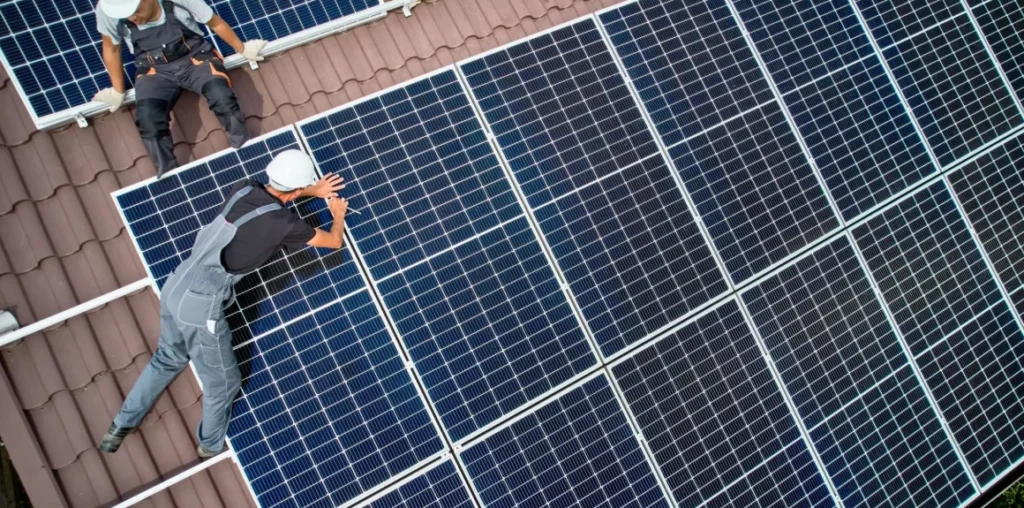Residential solar panels have become a popular option for homeowners looking to reduce energy costs and increase their home’s energy efficiency. These panels are designed to capture sunlight and convert it into electricity, offering a sustainable energy solution for residential properties. Over the years, the technology behind solar panels has advanced, making them more efficient, affordable, and accessible to homeowners across the globe.
The Benefits of Installing Residential Solar Panels
The main reason homeowners consider installing residential solar panels is the significant reduction in energy costs. Solar panels generate electricity from the sun, which is a free and renewable energy source. This means that once the system is installed, homeowners can lower their reliance on traditional energy providers, which often means a substantial decrease in monthly utility bills. In addition to saving money, solar panels contribute to environmental sustainability by reducing the carbon footprint.
How Do Residential Solar Panels Work?
Solar panels work by utilizing photovoltaic (PV) cells that convert sunlight into electricity. When sunlight hits these cells, it creates an electric current through a process known as the photovoltaic effect. The energy is then transferred through an inverter, which converts the direct current (DC) electricity into alternating current (AC) electricity that can be used to power your home. Excess energy that is not immediately used can often be stored in batteries or fed back into the grid, depending on the type of system installed.
Factors to Consider Before Installing Residential Solar Panels
Before making the decision to install residential solar panels, there are several important factors to consider. First, evaluate your home’s location and its exposure to sunlight. Homes that receive more direct sunlight throughout the day are ideal for solar panel installation. Second, the size of your roof and the type of roofing material may also influence your installation options. A professional solar company will be able to assess these factors and help you determine the best system for your needs.
Choosing the Right Residential Solar Panels for Your Home
When selecting residential solar panels, quality is a key consideration. Not all solar panels are created equal, and the efficiency of the panel can vary significantly between different models and manufacturers. The best residential solar panels should offer high efficiency, meaning they can convert more sunlight into usable electricity. Additionally, consider the durability and warranty offered with the panels. High-quality panels typically come with long-term warranties, providing peace of mind that your investment will last for many years.
Costs Involved in Installing Residential Solar Panels
While the initial cost of installing residential solar panels can be substantial, many homeowners find that the long-term savings make it a worthwhile investment. The cost of installation depends on several factors, including the size of the system, the quality of the panels, and the complexity of the installation. Many solar companies offer financing options, which can help offset the upfront costs. Additionally, federal and state incentives may be available to help reduce the overall cost of installation.
Exploring Solar Incentives and Rebates
In many regions, there are government incentives and rebates available to homeowners who install residential solar panels. These incentives can significantly reduce the cost of installation. For example, in the United States, there is a federal solar tax credit that allows homeowners to deduct a percentage of the installation costs from their federal taxes. Many states and local governments also offer additional incentives, so it’s important to research what is available in your area to take full advantage of these savings.
The Role of Solar Inverters in Residential Systems
Inverters play a critical role in the efficiency of any solar panel system, as they convert the DC electricity produced by the panels into AC electricity, which powers your home. When working with a solar installation contractor, it’s important to consider the type of inverter best suited for your system. There are various options, such as string inverters, microinverters, and power optimizers. Each type has its benefits and limitations, so consulting with an experienced solar installation contractor can help you choose the right inverter for your residential setup, ensuring optimal performance and efficiency.
Maintenance and Longevity of Residential Solar Panels
One of the main advantages of residential solar panels is their low maintenance requirements. Once installed, solar panels are relatively easy to maintain. Regular cleaning of the panels and inspections to ensure that they are free from debris or damage is generally all that is required. Solar panels are built to last, with many systems having a lifespan of 25 years or more. Some manufacturers even offer performance guarantees, ensuring that your panels will continue to produce a certain amount of electricity over the years.
The Environmental Impact of Residential Solar Panels
Installing residential solar panels is an effective way to reduce your carbon footprint. Solar energy is a clean, renewable energy source that does not produce harmful emissions. By switching to solar power, homeowners can reduce their reliance on fossil fuels and help combat climate change. In addition to the environmental benefits, using solar power can also reduce the strain on the electrical grid, especially during peak demand periods.
How to Find the Best Residential Solar Panel Installer
Choosing the right installer is just as important as selecting the right solar panels. A reputable solar company will not only help you choose the best panels for your home but will also ensure that the installation is done professionally and efficiently. Look for solar installers with experience in residential systems and a solid track record of customer satisfaction. It’s also important to verify that the company is licensed and insured to perform solar installations in your area.
Is It Worth the Investment to Install Residential Solar Panels?
Ultimately, whether or not residential solar panels are a good investment depends on your specific situation. Factors such as your local climate, energy consumption, and available incentives will all play a role in determining whether solar panels will be a cost-effective solution for your home. However, many homeowners find that the long-term savings on their energy bills, along with the environmental benefits, make solar panels a smart investment.
Summery
Residential solar panels offer a sustainable and cost-effective energy solution for homeowners looking to reduce their energy bills and lessen their environmental impact. By understanding how solar panels work, considering all factors involved in installation, and selecting high-quality panels and a reliable installer, you can enjoy the long-term benefits of solar energy. Whether you’re looking to save money or reduce your carbon footprint, residential solar panels are a smart and forward-thinking choice for any homeowner.




